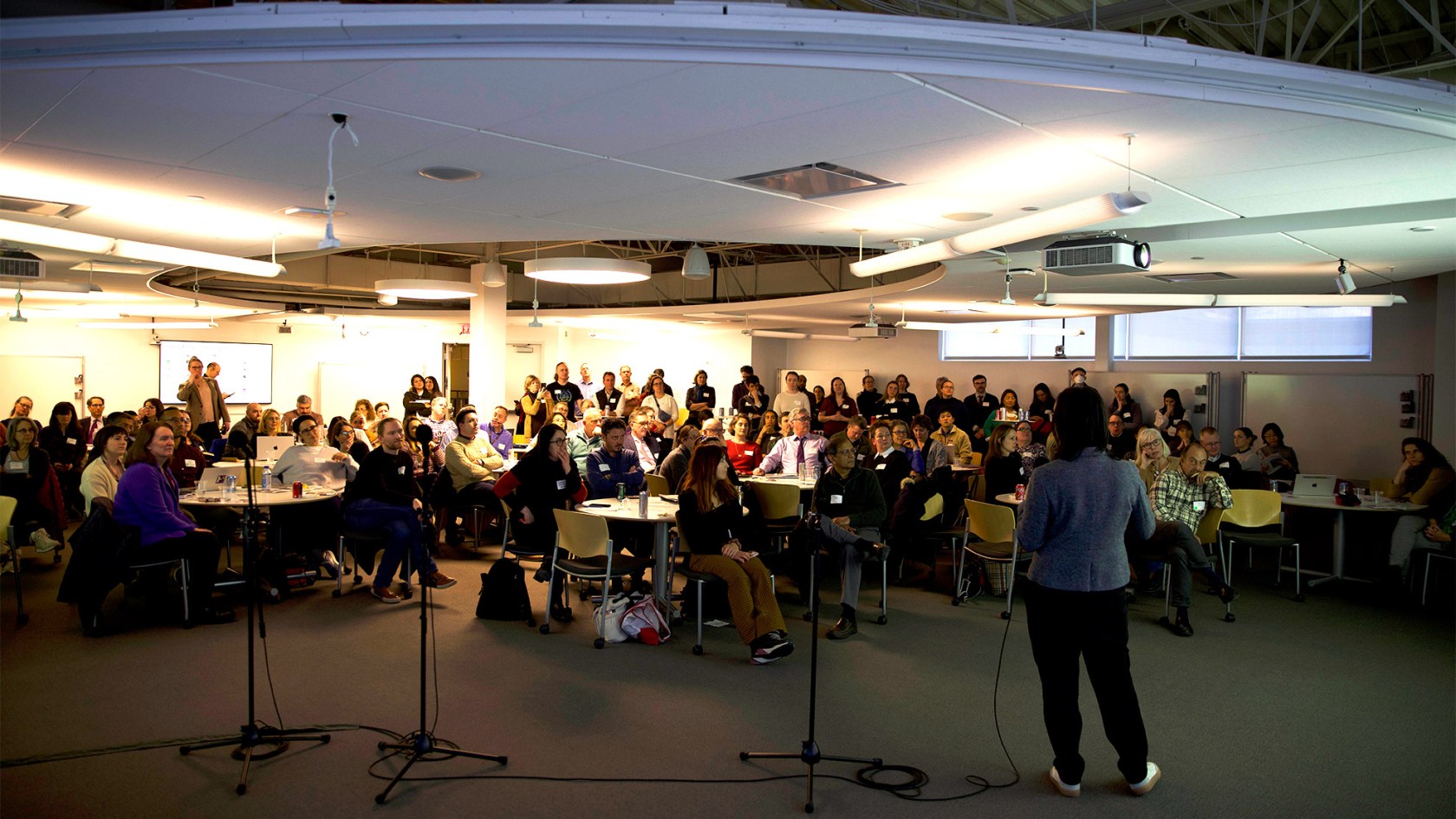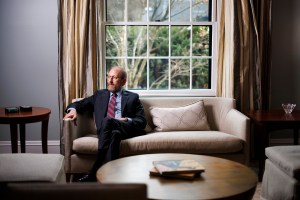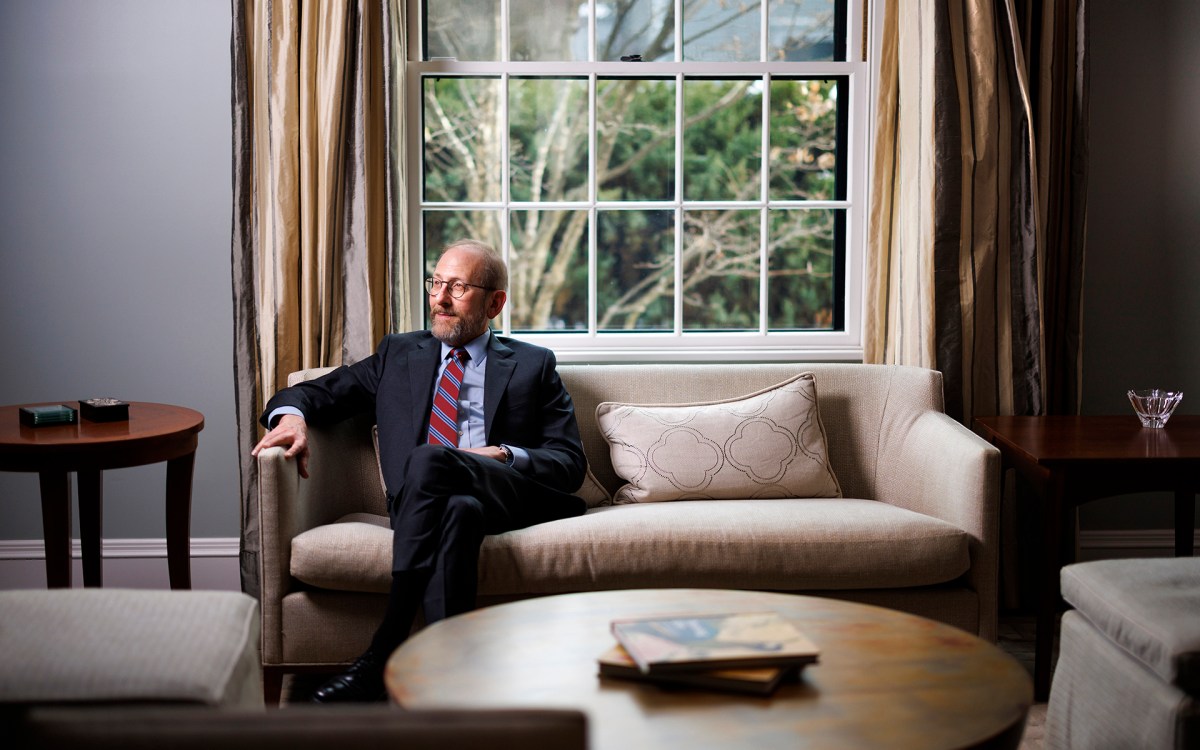New Learning Experience Platform opens doors to innovation in teaching

The LXP’s rollout celebration was held at Harvard Business School’s Batten Hall with more than 120 in attendance.
Flexible, modular platform supports unique pedagogical approaches
Harvard marked a milestone in January with the launch of the Learning Experience Platform (LXP) — a University-wide initiative designed to support innovative teaching and enable cutting-edge digital learning experiences.
Hosted at Harvard Business School’s Batten Hall, more than 120 participants, including faculty, deans, and senior administrators, gathered to celebrate the LXP’s rollout. In his opening remarks, Vice Provost for Advances in Learning Bharat Anand underscored the collaborative nature of the effort, developed jointly by the Office of the Vice Provost for Advances in Learning (VPAL), Harvard University Information Technology (HUIT), and Harvard Business School.
“This is about ensuring we retain control over our pedagogical future,” Anand said. “We’ve built a platform that reflects Harvard’s values — one that’s modular, flexible, and rooted in over a decade of innovation in online learning.”
Ten years in the making
Harvard has long been a leader in digital learning. From co-founding edX in 2012 to pioneering asynchronous case-based learning through HBS Online, the University has consistently explored how technology can expand access and enhance learning.
The pandemic accelerated this shift, highlighting both the opportunities and limitations of existing platforms. The 2022 Harvard Future of Teaching and Learning Report identified, among other things, the need for a modern digital learning platform to match the excellence of Harvard’s physical infrastructure.
LXP answers this call. Built to support online and hybrid learning, it offers a flexible, modular platform that supports a wide range of teaching styles and course lengths and leverages innovative “teaching elements” around peer and active learning, including “online cold calls” and tools for surfacing viewpoint diversity. It enables consistent, high-quality learning experiences for everyone from first-years to alumni and global learners.
Solving for fragmentation
One of the motivations for building the LXP was to reduce the complexity and fragmentation of the digital learning ecosystem. “If a learner wanted to find a Harvard course on AI or climate change today, they’d have to visit over a dozen websites,” Dustin Tingley, deputy VPAL, noted.
“There are 40-plus learning platforms that are currently managed by HUIT, creating technology clutter and cost inefficiencies,” said Emily Bottis, HUIT’s managing director for academic technology.
“We needed to solve that fragmentation and inefficiency while preserving the ability to innovate locally,” added Zachary Wang, VPAL’s director of strategic technology.
The LXP consolidates efforts across Schools and allows for consistency in experience while supporting unique pedagogical approaches. Seven Harvard Schools already use the platform in different ways.
Early successes
The first program launched on the platform was a pre-matriculation course for incoming Harvard Law School students — 20 hours of foundational content that other law schools now can customize for their own needs. This kind of modularity, said HLS Online Executive Director Leah Plunkett, is one of LXP’s greatest strengths: “You can create once and customize infinitely.”
Another milestone came last summer, when more than 1,600 incoming Harvard College first-years completed three short orientation modules through the LXP. These included videos featuring faculty, polls, peer-engagement tools, and interactive content.
“I think what really was the innovation last summer [in online orientation] was getting students excited,” said Katherine Veach, assistant dean for first-year academic programs. “We were able to deliver essential information in a way that felt personal and engaging. Students heard directly from faculty they may have already known, read, or were eager to learn from. The platform made that experience memorable and interactive at scale in a way emails never could.”
Designed for what’s next
LXP is already supporting a broad range of learning experiences, from short modules to semester-long programs, with plans underway to expand offerings for Harvard’s alumni and international partners. Its flexibility enables everything from 15-minute tutorials to multiweek blended courses.
“A 12-week semester is natural for residential learning,” said Anand. “But online, that format doesn’t always make sense. What if an executive program met one day a week for five weeks? Or what if a course could adapt its length to fit the learning outcomes, rather than the academic calendar, whether that meant 10 weeks or 10 hours? The LXP allows Harvard to design around the needs of the learner — not the limitations of legacy systems.”
Built on three big ideas
Anand described three principles that guided the LXP’s creation.
First, pedagogical creativity: “Our faculty are full of ideas for innovative teaching. They shouldn’t have to fit those ideas into one-size-fits-all platforms. The LXP gives them the flexibility to design learning experiences that truly reflect their vision.”
Second, a One Harvard vision: “The platform is available to all Harvard’s Schools and ensures a consistently high-quality learning experience across each, while still allowing for local customization to reflect each School’s unique voice, priorities, and pedagogy.”
Third, global reach: “Whether through online courses, livestreams, or blended experiences, the LXP allows one to deliver on the University’s mission to engage learners at scale far beyond campus.”
With the platform now live, faculty are encouraged to explore new ways to elevate their teaching and connect with learners.
“We’ve built the foundation,” Anand said. “It’s now up to our faculty and academic staff to imagine what comes next, and to create learning experiences that are as inspiring and impactful as the ideas we teach.”




